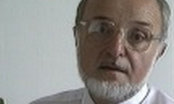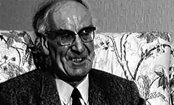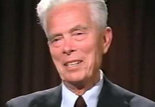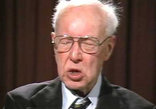Geography Interviews G61-G68
|
|
PAL COLOUR 22 MINS Born on a sheep farm in Wales, David Hooson became curious about rural geography and the cultural landscape at an early age. Having studied first at Oxford, he travelled to the United States and there explored the geography of the Soviet Union during those critical "Cold War" years of the l950's. Later, at the University of California, Berkeley, Hooson became more interested in the intellectual history of the discipline and in l980 became Chairman of the International Geographical Union's Working Group on the History of Geographical Thought. Interviewer: Paul Claval Language: English Recorded: Palacio de Congresos at Barcelona, September l986, by Kurt-Åke Lindhe of Tetra-Pak Studios, Lund, Sweden. Availability: Video
|
|
|
G 62 GEOGRAPHY AT THE HUNGARIAN ACADEMY OF SCIENCES: AN INTERVIEW WITH DR. MARTON PECSI PAL COLOUR 27 MINS At the Hungarian Academy of Sciences geographers seek to integrate human and physical branches of disciplinary enquiry. Marton Pecsi, Director of the Geographical Institute, was first attracted to geography via curiosity about the history of civilizations, only later to become trained as geomorphologist and specialist in loess research. In this interview he describes the past and present research concerns of the Institute and the prospects for future applied work on nature conservation and ecological issues. Interviewer: Anne Buttimer Language: English Recorded: At Palacio de Congresos, Barcelona, on September 3, 1986, by Kurt-Åke Lindhe, Tetra-Pak Studios,Lund, Sweden Availability: Video, Transcript |
|
|
NTSC COLOUR 61 MINS Leading specialist in both archeology and cultural ecology, Butzer is one of the few modern geographers whose research interests span both physical and cultural branches of the field. In this interview he describes some formative influences on his choice of professional vocation, his research in Africa and Near East, and he recent work on Iberian themes, both in Spain and in Southwestern United States. He shares reflections on the interplay of inductive and deductive approaches to geographic research and argues strongly for geography's role as an integrative science. Interviewer: Anne Buttimer Language: English Recorded: University of Texas at Austin Language Laboratories, May 1987 Availability: Video |
|
|
PAL COLOUR 60 MINS Terry Slater and Jeremy Whitehand of the Urban Morphology Research Group at the University of Birmingham, recorded this conversation with Emeritus Professor M. R. G. Conzen a few weeks before his eightieth birthday. In it he talks of his early life in Germany, the teaching he received in the University of Berlin and the inspiration for his first research, his enforced move to England and a new career as a planner, and a return to academic work at the University of Newcastle in 1946. The latter part of the recording expounds on the way in which his development of the field of urban morphology was undertaken, his conceptual thinking and his continuing research and thought. Participants: M. R. G. Conzen, Terry R. Slater and Jeremy W. R. Whitehand Language: English Recorded: Birmingham, November 1986 by Alan Duxbury Availability: Video
|
|
|
G 65 AN INTERVIEW WITH PROFESSOR GILBERT F. WHITE PAL COLOUR 30 MINS American geography's leading voice urging environmental concern and recipient of the 1988 Laureat d'Honneur of the International Geographical Union, Gilbert White here describes the circumstances leading to his interests in geography. Youthful experiences of drought and the need for conservation in Wyoming, the 1929 crash, evoked curiosities which led to formal training at University of Chicago. He served on the US Government's Advisory team for national resource planning, and after wartime service spent several years promoting liberal education at Haverford College, before returning to Chicago in the 1950s. His major research efforts have since then been directed toward analyses of environmental risks and hazards, and here he shares some insight into the challenge of international research cooperation and the emergence of a global consciousness. Interviewer: Anne Buttimer Language : English Recorded: Sydney University TV Service, September 1988 Availability: Video |
|
|
PAL COLOUR 47 MINS Native of England and graduate of Kings' College, London, Kenneth Hare has lived in Canada for over 40 years. Here he describes the early environmental experiences which evoked curiosities about nature and particularly climate. He describes the charismatic teaching of Woodridge and the energetic Dudley Stamp, his wartime activities with the British Meteorological Service, and subsequent move to McGill University. Climate and climatic change were to become central to his subsequent research interests, and The Restless Atmosphere remains one of the key texts in this field. Challenges facing environmental researchers today are then discussed and tensions between scientific and policy-oriented aims are aired. Interviewer: Bruce Thom Language : English Recorded: Sydney University TV Service, September 1988 Availability: Video
|
|
|
PAL COLOUR 45 MINS This famous writer and critic here tells of his education at Cambridge and his teaching experiences in Rangoon, Burma, before moving to Canberra, Australia where he became Foundation Professor of Geography at the Australian National University in 1951. The challenge of large-scale works in historical geography are then aired as he describes his experiences as Director of the Research School of Pacific Studies (1967-72) and his three-volume magnum opus, The Pacific since Magellan (1979, 1983, 1988). Interviewer: David Hooson Language : English Recorded : Sydney University TV Service, September 1988 Availability: Video |
|
|
PAL COLOUR 27 MINS Secretary-General of the International Geographical Union from 1956-64, Chauncy Harris has dedicated much of his life to promoting international research cooperation. He tells here of his early interests in the location and relative size of urban settlements in his native Utah, interests which were further developed at University of Chicago in the 1930s. Later he studied in England and during study visits to the continent he became familiar with other languages, all of which supported his later commitment to the documentation of geographical literature, and the promotion of international organization. Central to his entire postwar career have been the geography of the Soviet Union, and the history of geographical thought. Interviewer: Anne Buttimer Language : English Recorded : Sydney University TV Service, September 1988 Availability : Video
|
| |
|
| |







